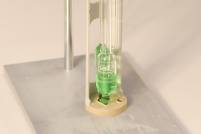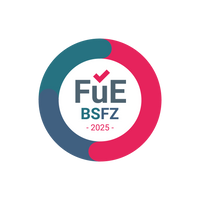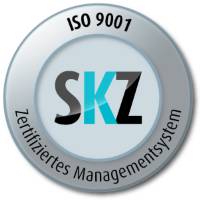LÖSLICHE FARBSTOFFE
Anwendungsbeispiel: Mineralöl und Wachs
Mineralöl und Paraffine und andere Kohlenstoff-Wasserstoff-Verbindungen können mit sog. fettlösliche und öllösliche Farbstoffe eingefärbt werden. Man hat schonmal davon gehört daß bestimmte Benzinmarken auch mit Farbstoffen markiert sind. Farbstoffe ermöglichen ein sichtbares Unterscheidungsmerkmal für Marken und Anwendungen bei verschiedenen Produktsorten z.B. bei Schmieröl.
Anwendungsbeispiel: Farbstoffe für Reiniger
Optische Aufheller und lösliche Farbstoffe werden in fast allen Reinigungsmitteln verwendet und sollen hochgradig löslich in warmen Wasser sein aber gleichzeitig stabil gegenüber alkalischen Bedingungen. Für Reinigungssysteme in Auto-Waschanlagen erfüllen Farbstoffe die Aufgabe eines Indikators für Waschkomponenten. Daneben stellen hohe und niedrige pH Werte bei Desinfektionsreinigern erhöhte Anforderungen an die Stabilität der Farbstoffe aufgrund der harten Umgebung um eine Zersetzung zu vermeiden.
Colux bietet eine große Auswahl an wasserlösichen Farbstoffen und optische Aufheller in flüssiger Form oder in Pulverform an. Üblicherweise kommen Säure- bzw. Basische Farbstoffe zu Einsatz gestaffelt nach der benötigten pH Stabilität max. 1 bzw. 13.
Anwendungsbeispiel: Tintenherstellung
Das Substrat und die Applizierungstechnologie geben vor, ob die Tinte auf Wasserbasis oder Lösemittelbasis oder monomerbasierend ist. Für den Einsatz von Pigmenten oder Farbstoffen sprechen sehr unterschiedlichen Eigenschaften bei der Dispergierbarkeit, Lösbarkeit, Feinheit und Echtheit. Bei der Tintenherstellung wird grundsätzlich Wert auf die Feinheit, Farbstärke, geringen Salzgehalt und Lichtstabilität gelegt. Vorteile bietet eine hohe Konzentration des Farbstoffs oder Pigmentes in Form von Präparationen. Farbstoffe eignen sich zum Einfärben von Reinigern insbesondere Weichspüler, Kalkreiniger, Geschirrspülmittel, Bleichmittel, Chlorreiniger, Boden- und Badreiniger, Flüssigseife, Desinfektionsmittel, Universalreiniger, Glasreiniger. Wichtig ist dabei der pH-Wert und die Endanwendung, wobei der pH-Wert entscheidend ist für die Stabilität des Farbstoffs in dem Bereich und die Anwendung entscheidet in der Regel auch, in welchem welcher Farbe gefärbt wird. Typischerweise in der Kombination sind saure Farbstoffe rot gefärbt, alkalische blau gefärbt und neutrale, gelb oder grün oder eben auch nicht gefärbt. Bei der Auswahl von Farbstoffen im industriellen Bereich unterscheidet man dann auch noch explizit die chemische reinigende Substanz, weil die auch Einfluss hat auf die Stabilität der Farbstoffe, die auch eine Lagerstabilität besitzen sollen. Bei der Aufteilung für Farbstoffen kann man in den Klassen Lebensmittelfarbstoffe und Säure und basische Farbstoffe unterteilen, wobei auch Pigmente infrage kommen, aber das ist ein separates Thema. Farbstoffe lösen sich vollständig auf, während Pigmente sich nicht lösen. Bei den Lebensmittelfarbstoffen unterscheiden wir zunächst eine Liste unterteilt in den einzelnen Farbmittelen wie folgt.
Anwendungsbeispiel: Markieren und Tagging
Ergänzend zur Auswahl an Fluoreszenzfarbstoffen zählen dann auch die optischen Aufheller - die ansich farblos sind und nur unter UV-Licht fluoreszieren. Wobei diese optischen Aufheller eher unlösliche organische Pigmente sind im Vergleich zu den löslichen bunten Farbstoffen. Anwendung finden diese optischen Aufheller meist in Kunststoffanwendungen z.B. PVC oder in flüssiger Lieferform für wässrige Systeme z.B. Lacke.
Die fluoreszierende Eigenschaft nutzt auch in Anwendungen zum Erkennen von Leckagen und zum Kennzeichnen von Produkten als Sicherheitsmerkmal. Mittels Schwarzlicht oder UV-Lampe tritt die Fluoreszenz auffällig in Erscheinung z.B. zur Kontrolle einer Verarbeitungsprozesses oder flächigen Beschichtung oder Anwendung des eigenen Produkts bei der Fehlersuche.
Anwendungsbeispiel: Papierindustrie
• Anionische Direkt Farbstoffe in Pulverform und Flüssigkonzentrat
• Kationische Basic Farbstoffe in Pulverform und Flüssigkonzentrat
• Farbstoffe für die Kartonherstellung
• Food Dyes E133, E104… für Servietten und Lebensmittelkontakt
Die flüssige Lieferform gewährt eine optimale Lösung (gesättigte Lösung) und einfache Handhabung beim dosieren und vermeidet Verunreinigungen durch Stäube. Beim Lösen von Pulvern sind zusätzliche Arbeitsschritte erforderlich um die Löslichkeit des Farbstoffs zu begünstigen. Farbstoffe tendieren bei einer Übersättigung zum Ausbluten der nicht gebundenen Anteile. „WENIGER IST MEHR“ ist ein guter Ansatz. Farbstoffmischungen tendieren zum trennen wegen seiner individuellen Eigenschaft in Anbindung an das Substrat. Für anionische Farbstoffe und die Eigenschaft geringerer Affinität wird die Zugabe von Fixativ empfohlen, bei kationischen Farbstoffen nicht.
Viele unserer Farbstoffe können kiloweise und in Kleingebinde verpackt bezogen werden!
REGULATORY STATUS - CONFORMITÄT DER PRODUKTE
Allergens | To our knowledge, this product does not intentionally contain any of the following known allergens: Peanuts, Milk, Fish, Tree Nuts, Eggs, Shellfish, Wheat, Natural Latex, Celery, Mustard, Sesame Seeds, soybeans, or Sulfites. Note that according to the Food Allergen Labeling and Consumer Protection Act (FALCPA), the list of “major food allergens” does not include a highly refined oil derived from one of the eight foods or food groups or any ingredient derived from such an oil. |
BPR, Regulation (EU) 528/2012 | Not Applicable. Product does not contain biocide. |
Toxics in Packaging Clearing House (TPCH, formerly CONEG) and EU Directive 94/62/EC & amendments on packaging and packaging waste | Lead, cadmium, mercury and hexavalent chromium have not been intentionally added to this product. The sum of the concentration levels of lead, cadmium, mercury and hexavalent chromium incidentally present in this product do not exceed 100 parts per million by weight. |
Conflict Minerals | According to documentation we have received from our suppliers, no “conflict minerals” that originate from Democratic Republic of the Congo, Congo Republic, Central Africa Republic, Tanzania, Sudan, Burundi, Zambia, Rwanda, Angola or Uganda are intentionally added to or known to be present in this product. |
California Safe Drinking Water and Toxic Enforcement Act (Proposition 65) | Please see Section 15 of US Safety Data Sheet |
Directive 2015/863/EU on the restriction of the use of certain hazardous substances in electrical and electronic equipment (RoHS) | This product contains no lead, mercury, cadmium or hexavalent chromium that, to our knowledge, has been intentionally introduced as an element during manufacture or distribution. We do also not intentionally add any brominated flame retardants (such as polybrominated biphenyls (PBB) and polybrominated diphenyl ethers (PBDE)), or phthalates (DEHP, BBP, DBP, and DIBP), nor do we have any reason to expect these to be present from any contaminates or by- products above background levels. |
REACH Substances of Very High Concern (SVHCs) | To our knowledge, this product does not contain any of the 209 substances that are included on the ‘Candidate List of Substances of Very High Concern for Authorisation’, as published on 25th June 2020, in a concentration above 0.1%. Please also see Section 15 of EU Safety Data Sheet. |
Toy Safety Directive 2009/48/EC and its amendments | This regulation applies to migration of specific substances from toys as final articles and as such is not directly relevant for components of toys. The EN 71 European Standard on the Safety of Toys has been harmonised by the EC as the default standard which toys must meet, and it is divided into 13 parts corresponding to sections in Annex II of the Directive. The Substances as listed in Annex II section III parts 3, 8, 11, and 13 are not intentionally added, known, or expected to be present in above mentioned product, nor does the product come into contact with these substances in manufacturing, processing, or packaging: Part 3. Carcinogenic, mutagenic, or reprotoxic (CMR) substances Part 8. Nitrosamines and nitrosable substances Part 11. Listed Allergenic Fragrances Part 13. Listed Heavy metal elements It remains the toy manufacturer’s responsibility to carry out the requisite practical tests mentioned in the Toys Standard on the final toy product. Packaging materials used with toys are not within the scope of the standard unless they form part of the toy or have intended play value. |
Substances of Concern | We have not specifically analyzed this product for the presence of the following substances; however, we do not intentionally add any such materials to this product, therefore none are expected to be present above background levels.
Please also see Section 15 of Safety Data Sheet for additional country- specific regulations. |




